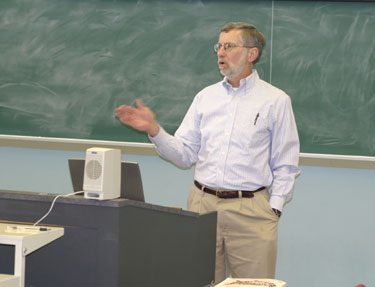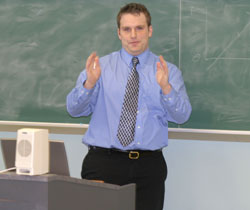Initial research shows Wabash students don’t alter their political or social views significantly through four years of college. Additionally, they become more concerned about life’s bigger questions and less about making money.
 Political Science Professor David Hadley and Wabash senior Justin Grimmer are involved in a year-long study of "The Wabash Experience." They presented initial findings of their research February 17 as part of a Social Science Colloquium in Baxter Hall.
Political Science Professor David Hadley and Wabash senior Justin Grimmer are involved in a year-long study of "The Wabash Experience." They presented initial findings of their research February 17 as part of a Social Science Colloquium in Baxter Hall.
"We wanted to see the extent to which Wabash students change in their self-perceptions, their personal goals and objectives, and social and political opinions," Hadley explained.
Hadley is on sabbatical and doing his research with the support of the Center of Inquiry in the Liberal Arts. His data are from surveys Wabash freshman take when entering college and comparing the answers to the same questions when they graduate.
The data are from surveys completed from 1996 through 1999. During that span 926 freshmen took the survey and 691 of them completed it again four years later.
"The major changes we see are that as a result of or during their liberal arts education at Wabash, students come to value more the importance of developing a meaningful philosophy of life and to see less value in simply making money," Hadley said.
The data have been broken down for study in several ways including Indiana and non-Indiana students and by area of study concentration.
While many areas show little change through the four years there are areas where statistically significant change appears.
In the area of self-perception, students felt more self confident in themselves and slightly more self-confident specifically in their academic ability. On the other han d, they felt less confident about their physical health and math skills.
On social issues there is no clear pattern.
"A perception is that students go away to college and they are bent and shaped in ways that maybe some people view with suspicion," Hadley said of the research’s surprising results. "But Wabash students, in terms of political and social attitudes and their descriptions of themselves in terms of ideology, move in no consistent direction.
"What may be surprising to some is that students who major in the social sciences don’t become more liberal, but in fact view themselves as being more conservative after spending four years at Wabash. And students who major in natural sciences and mathematics rather than maybe being moved in a more conservative direction, view themselves as more liberal after four years at Wabash."
 Grimmer focused on what he called the ‘stayers and leavers’ or the likelihood of graduation.
Grimmer focused on what he called the ‘stayers and leavers’ or the likelihood of graduation.
"I was interested in the difference between living in Indiana and being from out of state, the differences in the characteristics of the student," he said. "I think it’s particularly interesting with the strategic plan that our administration now has to try to get students to stay here more often; the need to get students from out of state to have a diverse classroom seems like it could result in some tension."
Perhaps not surprisingly, out of state students are somewhat less likely to graduate. To no one’s surprise, involvement in activities like athletics significantly increases the likelihood of graduation with little variance due to academic scores.
"It looks like not being from Indiana or a contiguous state is going to decrease the probability of you graduating from Wabash," Grimmer said. But, by recruiting students with higher academic abilities and stronger expectations of participating in intercollegiate athletics, prospects for retaining the out-of-state students improves.
Hadley and Grimmer will continue working on their project through the end of the school year.